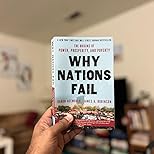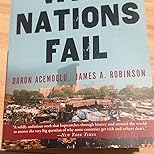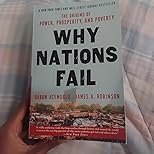
Kindle
from $14.25
Audiobook
$0.99with membership
Hardcover
from $32.14
Paperback
$18.81
Other Used and New from $14.68

Audible sample
Follow the authors

Daron AcemogluDaron Acemoglu
Follow

James A. RobinsonJames A. Robinson
Follow
Why Nations Fail: The Origins of Power, Prosperity, and Poverty Paperback – September 17, 2013
by Daron Acemoglu (Author), James A. Robinson (Author)
4.5 4.5 out of 5 stars (8,762)
4.1 on Goodreads
52,432 ratings
#1 Best Seller in Economic Conditions
See all formats and editions
NEW YORK TIMES AND WALL STREET JOURNAL BESTSELLER • From two winners of the 2024 Nobel Prize in Economic Sciences, “who have demonstrated the importance of societal institutions for a country’s prosperity”
“A wildly ambitious work that hopscotches through history and around the world to answer the very big question of why some countries get rich and others don’t.”—The New York Times
FINALIST: Financial Times and Goldman Sachs Business Book of the Year Award • ONE OF THE BEST BOOKS OF THE YEAR: The Washington Post, Financial Times, The Economist, BusinessWeek, Bloomberg, The Christian Science Monitor, The Plain Dealer
Why are some nations rich and others poor, divided by wealth and poverty, health and sickness, food and famine? Is it culture, the weather, or geography that determines prosperity or poverty? As Why Nations Fail shows, none of these factors is either definitive or destiny.
Drawing on fifteen years of original research, Daron Acemoglu and James Robinson conclusively show that it is our man-made political and economic institutions that underlie economic success (or the lack of it). Korea, to take just one example, is a remarkably homogenous nation, yet the people of North Korea are among the poorest on earth while their brothers and sisters in South Korea are among the richest. The differences between the Koreas is due to the politics that created those two different institutional trajectories. Acemoglu and Robinson marshal extraordinary historical evidence from the Roman Empire, the Mayan city-states, the Soviet Union, the United States, and Africa to build a new theory of political economy with great relevance for the big questions of today, among them:
• Will China’s economy continue to grow at such a high speed and ultimately overwhelm the West?
• Are America’s best days behind it? Are we creating a vicious cycle that enriches and empowers a small minority?
“This book will change the way people think about the wealth and poverty of nations . . . as ambitious as Jared Diamond’s Guns, Germs, and Steel.”—BusinessWeek
Read less
Report an issue with this product or seller
What are popular highlights?
Previous page

This book will show that while economic institutions are critical for determining whether a country is poor or prosperous, it is politics and political institutions that determine what economic institutions a country has.
Highlighted by 5,341 Kindle readers

Inclusive economic institutions also pave the way for two other engines of prosperity: technology and education.
Highlighted by 5,102 Kindle readers

Politics is the process by which a society chooses the rules that will govern it.
Highlighted by 5,063 Kindle readers
Next page
Editorial Reviews
Review
"Should be required reading for politicians and anyone concerned with economic development." —Jared Diamond, New York Review of Books
"...bracing, garrulous, wildly ambitious and ultimately hopeful. It may, in fact, be a bit of a masterpiece."—Washington Post
“For economics and political-science students, surely, but also for the general reader who will appreciate how gracefully the authors wear their erudition.”—Kirkus Reviews
“Provocative stuff; backed by lots of brain power.”—Library Journal
“This is an intellectually rich book that develops an important thesis with verve. It should be widely read.” —Financial Times
“A probing . . . look at the roots of political and economic success . . . large and ambitious new book.” —The Daily
“Why Nations Fail is a splendid piece of scholarship and a showcase of economic rigor.” —The Wall Street Journal
"Ranging from imperial Rome to modern Botswana, this book will change the way people think about the wealth and poverty of nations...as ambitious as Jared Diamond's Guns, Germs, and Steel."
—Bloomberg BusinessWeek
“The main strength of this book is beyond the power of summary: it is packed, from beginning to end, with historical vignettes that are both erudite and fascinating. As Jared Diamond says on the cover: 'It will make you a spellbinder at parties.' But it will also make you think.”—The Observer (UK)
"A brilliant book.” —Bloomberg (Jonathan Alter)
“Why Nations Fail is a wildly ambitious work that hopscotches through history and around the world to answer the very big question of why some countries get rich and others don’t.” —The New York Times (Chrystia Freeland)
"Why Nations Failis a truly awesome book. Acemoglu and Robinson tackle one of the most important problems in the social sciences—a question that has bedeviled leading thinkers for centuries—and offer an answer that is brilliant in its simplicity and power. A wonderfully readable mix of history, political science, and economics, this book will change the way we think about economic development. Why Nations Fail is a must-read book." —Steven Levitt, coauthor of Freakonomics
"You will have three reasons to love this book. It’s about national income differences within the modern world, perhaps the biggest problem facing the world today. It’s peppered with fascinating stories that will make you a spellbinder at cocktail parties—such as why Botswana is prospering and Sierra Leone isn’t. And it’s a great read. Like me, you may succumb to reading it in one go, and then you may come back to it again and again." —Jared Diamond, Pulitzer Prize–winning author of the bestsellers Guns, Germs, and Steel and Collapse
"A compelling and highly readable book. And [the] conclusion is a cheering one: the authoritarian ‘extractive’ institutions like the ones that drive growth in China today are bound to run out of steam. Without the inclusive institutions that first evolved in the West, sustainable growth is impossible, because only a truly free society can foster genuine innovation and the creative destruction that is its corollary." —Niall Ferguson, author of The Ascent of Money
"Some time ago a little-known Scottish philosopher wrote a book on what makes nations succeed and what makes them fail. The Wealth of Nations is still being read today. With the same perspicacity and with the same broad historical perspective, Daron Acemoglu and James Robinson have retackled this same question for our own times. Two centuries from now our great-great- . . . -great grandchildren will be, similarly, reading Why Nations Fail." —George Akerlof, Nobel laureate in economics, 2001
"Why Nations Fail is so good in so many ways that I despair of listing them all. It explains huge swathes of human history. It is equally at home in Asia, Africa and the Americas. It is fair to left and right and every flavor in between. It doesn’t pull punches but doesn’t insult just to gain attention. It illuminates the past as it gives us a new way to think about the present. It is that rare book in economics that convinces the reader that the authors want the best for ordinary people. It will provide scholars with years of argument and ordinary readers with years of did-you-know-that dinner conversation. It has some jokes, which are always welcome. It is an excellent book and should be purchased forthwith, so to encourage the authors to keep working." —Charles C. Mann, author of 1491 and 1493
“Imagine sitting around a table listening to Jared Diamond, Joseph Schumpeter, and James Madison reflect on over two thousand years of political and economic history. Imagine that they weave their ideas into a coherent theoretical framework based on limiting extraction, promoting creative destruction, and creating strong political institutions that share power and you begin to see the contribution of this brilliant and engagingly written book.” —Scott E. Page, University of Michigan and Santa Fre Institute
“This fascinating and readable book centers on the complex joint evolution of political and economic institutions, in good directions and bad. It strikes a delicate balance between the logic of political and economic behavior and the shifts in direction created by contingent historical events, large and small at ‘critical junctures.' Acemoglu and Robinson provide an enormous range of historical examples to show how such shifts can tilt toward favorable institutions, progressive innovation and economic success or toward repressive institutions and eventual decay or stagnation. Somehow they can generate both excitement and reflection.” —Robert Solow, Nobel Laureate in Economics, 1987
“It’s the politics, stupid! That is Acemoglu and Robinson’s simple yet compelling explanation for why so many countries fail to develop. From the absolutism of the Stuarts to the antebellum South, from Sierra Leone to Colombia, this magisterial work shows how powerful elites rig the rules to benefit themselves at the expense of the many. Charting a careful course between the pessimists and optimists, the authors demonstrate history and geography need not be destiny. But they also document how sensible economic ideas and policies often achieve little in the absence of fundamental political change.”—Dani Rodrik, Kennedy School of Government, Harvard University
“Two of the world’s best and most erudite economists turn to the hardest issue of all: why are some nations poor and others rich? Written with a deep knowledge of economics and political history, this is perhaps the most powerful statement made to date that ‘institutions matter.’ A provocative, instructive, yet thoroughly enthralling book.” —Joel Mokyr, Robert H. Strotz Professor of Arts and Sciences and Professor of Economics and History, Northwestern University
“A brilliant and uplifting book—yet also a deeply disturbing wake-up call. Acemoglu and Robinson lay out a convincing theory of almost everything to do with economic development. Countries rise when they put in place the right pro-growth political institutions and they fail—often spectacularly—when those institutions ossify or fail to adapt. Powerful people always and everywhere seek to grab complete control over government, undermining broader social progress for their own greed. Keep those people in check with effective democracy or watch your nation fail.” —Simon Johnson, co-author of 13 Bankers and professor at MIT Sloan
“This important and insightful book, packed with historical examples, makes the case that inclusive political institutions in support of inclusive economic institutions is key to sustained prosperity. The book reviews how some good regimes got launched and then had a virtuous spiral, while bad regimes remain in a vicious spiral. This is important analysis not to be missed.” —Peter Diamond, Nobel Laureate in Economics
“Acemoglu and Robinson have made an important contribution to the debate as to why similar-looking nations differ so greatly in their economic and political development. Through a broad multiplicity of historical examples, they show how institutional developments, sometimes based on very accidental circumstances, have had enormous consequences. The openness of a society, its willingness to permit creative destruction, and the rule of appear to be decisive for economic development.” —Kenneth Arrow, Professor Emeritus, Stanford University, Nobel Laureate in Economics, 1972
“Acemoglu and Robinson—two of the world's leading experts on development—reveal why it is not geography, disease, or culture which explains why some nations are rich and some poor, but rather a matter of institutions and politics. This highly accessible book provides welcome insight to specialists and general readers alike.” —Francis Fukuyama, author of The End of History and the Last Man and The Origins of Political Order
“Some time ago a little known Scottish philosopher wrote a book on what makes nations succeed and what makes them fail. The Wealth of Nations is still being read today. With the same perspicacity and with the same broad historical perspective, Daron Acemoglu and James Robinson have re-tackled this same question for our own times. Two centuries from now our great-great-…-great grandchildren will be, similarly, reading Why Nations Fail.”—George Akerlof, Nobel Laureate in Economics, 2001
“In this stunningly wide ranging book Acemoglu and Robinson ask a simple but vital question, why do some nations become rich and others remain poor? Their answer is also simple—because some polities develop more inclusive political institutions. What is remarkable about the book is the crispness and clarity of the writing, the elegance of the argument, and the remarkable richness of historical detail. This book is a must read at a moment where governments right across the western world must come up with the political will to deal with a debt crisis of unusual proportions.”—Steve Pincus, Bradford Durfee Professor of History and International and Area Studies, Yale University
“The authors convincingly show that countries escape poverty only when they have appropriate economic institutions, especially private property and competition. More originally, they argue countries are more likely to develop the right institutions when they have an open pluralistic political system with competition for political office, a widespread electorate, and openness to new political leaders. This intimate connection between political and economic institutions is the heart of their major contribution, and has resulted in a study of great vitality on one of the crucial questions in economics and political economy.”— Gary S. Becker, Nobel Laureate in Economics, 1992
“This not only a fascinating and interesting book: it is a really important one. The highly original research that Professors Acemoglu and Robinson have done, and continue to do, on how economic forces, politics and policy choices evolve together and constrain each other, and how institutions affect that evolution, is essential to understanding the successes and failures of societies and nations. And here, in this book, these insights come in a highly accessible, indeed riveting form. Those who pick this book up and start reading will have trouble putting it down.” ¯Michael Spence, Nobel Laureate in Economics, 2001
"In this delightfully readable romp through 400 years of history, two of the giants of contemporary social science bring us an inspiring and important message: it is freedom that makes the world rich. Let tyrants everywhere tremble!" —Ian Morris, Stanford University, author of Why the West Rules – For Now
“Acemoglu and Robinson pose the fundamental question concerning the development of the bottom billion. Their answers are profound, lucid, and convincing.” ―Paul Collier, Professor of Economics, Oxford University, and author of The Bottom Billion
About the Author
Daron Acemoglu is the Killian Professor of Economics at MIT. In 2005 he received the John Bates Clark Medal awarded to economists under forty judged to have made the most significant contribution to economic thought and knowledge. He is also the co-author of The Narrow Corridor: States, Societies, and the Fate of Liberty.
James A. Robinson, a political scientist and an economist, is the David Florence Professor of Government at Harvard University. A world-renowned expert on Latin America and Africa, he has worked in Botswana, Mauritius, Sierra Leone, and South Africa. He is also the co-author of The Narrow Corridor: States, Societies, and the Fate of Liberty.
Read more
Product details
Publisher : Crown; Reprint edition (September 17, 2013)
Language : English
Paperback : 560 pages
ISBN-10 : 0307719227
ISBN-13 : 978-0307719225
Lexile measure : 1300L
Item Weight : 14.4 ounces
Dimensions : 5.15 x 1.5 x 7.95 inchesBest Sellers Rank: #591 in Books (See Top 100 in Books)#1 in Economic History (Books)
#1 in Development & Growth Economics (Books)
#1 in Economic Conditions (Books)Customer Reviews:
4.5 4.5 out of 5 stars (8,762)
Videos
Videos for this product

0:27

Customer Review: Great condition!
Amazon Customer
Upload your video
About the authors
Follow authors to get new release updates, plus improved recommendations.
Previous page

Follow
Daron Acemoglu
Daron Acemoglu is the Killian Professor of Economics at MIT. In 2005 he received the John Bates Clark Medal awarded to economists under forty judged to have made the most significant contribution to economic thought and knowledge. (Photo by Peter Tenzer.)
See more on the author's page

Follow
James A. Robinson
James A. Robinson, a political scientist and an economist, is one of 8 current University Professors at University of Chicago. Focused on Latin America and Africa, he is currently conducting research in Bolivia, the Democratic Republic of the Congo, Sierra Leone, Haiti and in Colombia where he has taught for many years during the summer at the University of the Andes in Bogotá.
See more on the author's page
Next page
Customers say
Customers find the book amazing, well-written, and thought-provoking. They also find the insights immense, practical, and enlightening. Opinions are mixed on the narrative quality, with some finding it compelling and clear, while others say it has sophisms and is repetitive.
AI-generated from the text of customer reviews
Select to learn more
ReadabilityInsightValue for moneyNarrative qualityPacingLength
Reviews with images
See all photos
Previous page












Next page
Top reviews
Top reviews from the United States
Freh
5.0 out of 5 stars Noninclusive, extractive institituions cause the failure of national prosperity that is the primary cause of global inequality.Reviewed in the United States on November 23, 2017
Verified Purchase
Why Nations Fail: The Origins of Power, Prosperity, and Poverty. Daron Acemoglu and James A. Robinson. 2012.
The authors begin by comparing life in Nogales, Arizona with life in Nogales, Sonora, which is only a few feet away across the Mexican border. Residents north of the border are healthier, live longer, have three times more household income, and enjoy much better government services, including law and order, with much less corruption than residents south of the border. Due to the proximity and shared background of the two cities, these striking differences cannot be explained by the usual references to geography, culture, ignorance, or the protestant work ethic. Instead, the cause is major differences of political and economic institutions between the US and Mexico. These differences have evolved because of the way the societies were formed in the early colonial period.
Spain’s and Portugal’s conquests of Mexico, Central America, and South America were complete. Hence, they were able to replace the already exploitative institutions of the indigenous peoples with similar noninclusive, extractive institutions of their own. The new European aristocracy established a system of absolutist rule with forced labor to extract the wealth and resources of indigenous peoples for themselves, Spain, and Portugal. Once established, this system persisted for centuries, including within many new countries formed after independence from Spain and Portugal. Infighting of elites over the spoils led to political instability with an endless succession of coups and dysfunctional governments. Dispossession and political exclusion of the general population led to slow economic growth from lack of incentives for innovation and entrepreneurship and from inability to counter the excesses of elites.
English colonization of the New World did not begin until after the defeat of the Spanish Armada in 1588 and hence was limited to the then less desirable portion that remained in North America. The English intended to establish exactly the same kind of noninclusive, extractive colonies as the Spanish and Portuguese. However, due to differing circumstances, their initial colony at Jamestown failed to subjugate the indigenous peoples, then failed to confiscate sufficient output from their own colonists. Consequently, the English were forced to introduce economic incentives and increased political participation to develop and retain more productive colonists. These changes persisted and evolved into the institutions of the US today that are much more inclusive and much less extractive than those of Latin America. It is the cumulative effects of these extractive institutions designed to take incomes and wealth from one subset of society to benefit a different subset that explain the differences in prosperity between Nogales, Arizona, and Nogales, Sonora. The authors then report that similar institutional factors in other countries and eras provide the best explanation for most differences in national prosperity for the rest of the world.
Alternative possible primary sources for differences in prosperity are discussed and dismissed. For geography and culture, this is done by comparing many adjacent regions with differing outcomes, such as Nogales, North and South Korea, West and East Germany, and adjacent sides of the Kasai River in the Congo. For religion, it is noted that recent Asian successes occurred without benefit of the Protestant work ethic and that Middle Eastern dysfunction is much more strongly related to successive extractive colonization by the Ottoman Empire and European powers than to the Islamic religion. For ignorance, it is noted that the leaders of underperforming countries are well aware of the problems of their extractive policies but choose them on purpose since they benefit at the expense of everyone else. Also, it is noted that many economists seem to favor the ignorance hypothesis because it implies more value for the advice they provide.
For much of world history, economic growth has been slow due to mostly noninclusive and extractive political and economic institutions, although with some variability. In ancient Rome, expansion and some economic growth occurred during the years of the Republic (510-28 B.C.) due to somewhat more inclusive (though still restrictive) political and economic institutions. Toward the end of the Republic and during the years of the Empire (28 B.C.-476 A.D), increasingly absolutist political rule, increased economic extraction by elites, markedly increased inequality, and eventually extreme political instability with endless civil wars resulted in complete collapse. In Medieval times, the Venetian Republic flourished from its onset in 810 A.D. due to relatively inclusive institutions and a favorable location for Mediterranean trade. However, the adoption of noninclusive institutions beginning in the 14th Century led to its decline to be the museum it is today. Many more historic examples are discussed.
Although noninclusive societies sometimes manage to achieve limited growth, it is usually unsustainable. The classic Maya civilization of 400-1200 A.D. (after the earlier 500 B.C.-100 A.D. cities) initially expanded due to centralized government and occupational specialization, but then declined due to political instability from elites fighting over the spoils of extraction. From 1928 to 1960, the Soviet Union achieved 6% annual growth of income by reallocating resources from agriculture to industry, but then declined and collapsed when this reallocation was complete. Thus, growth in extractive societies is unsustainable because technologic progress does not occur when most people in the economy lack the necessary incentives and security for innovation and the necessary political participation to limit extraction by elites. Indeed, political and economic elites who benefit
from the status quo often resist conditions that favor growth because they fear the creative destruction of a healthy economy.
World inequality dramatically increased with the British Industrial Revolution because only some parts of the world had the necessary inclusive institutions to adopt the spectacular changes of its innovations and new technology. These changes started in Briton and soon spread to Europe, the British “Settler Colonies” (US, Canada, Australia, and New Zealand), and Japan, then to South Korea, Taiwan, and China after World War II. They failed to spread to Sub-Saharan Africa, much of Latin America, the Middle East, and much of Asia due to the absence of favorable institutions. This failure was the legacy of centuries of institutions with absolutist political repression and economic extraction (including the slave trade), mostly from colonization by European countries, then from new countries’ own elites after independence in the 20th Century.
Absolutist rulers who feared economic change leading to political change actually blocked or delayed spread of the Industrial Revolution in the Ottoman Empire, Spain, Austria-Hungary, Russia, and China. Absolutism was not the only barrier to developing inclusive institutions. Some parts of the world, particularly in Africa, lacked a centralized state that could even provide the minimal law and order necessary for those institutions. European colonization even reversed some favorable institutional development, such as with the Portuguese and Dutch conquest of the Asian spice economy and with the expansion of the Atlantic slave trade for the sugar plantations and other colonies in the Americas.
The Industrial Revolution started and made its biggest strides in England because of her uniquely inclusive political and economic institutions. The emergence of constitutional rule and political pluralism made possible centralized government that could strengthen property rights, improve markets, undermine state-sanctioned monopolies, remove trade barriers, extend taxation to elites, and limit extraction by elites to increase incentives for innovators and entrepreneurs. Highlights in the evolution of this system included the Magna Carta of 1215, the Peasant’s Revolt of 1381, political centralization beginning after 1485 by the Tudors and continuing with the Glorious Revolution of 1688, the shift of authority from the monarch to Parliament after 1688, and subsequently numerous acts of Parliament that encouraged the countless innovations in textiles, other manufacturing, transportation, and trade occurring at the time.
Why did these inclusive changes vital to economic development occur first in England rather than somewhere else? According to the authors, the divergence of institutional characteristics between nations is largely the consequence of slow accumulation of small historical differences, the acts of individuals, or just random factors. This institutional drift is then amplified by critical junctures that lead to more rapid divergence, as in the following instances. The Black Death of 1346 led to labor shortages and land surpluses in Europe that ended feudalism in the West, where peasants had more bargaining power, but strengthened it in the East. The expansion of world trade after 1600 weakened the absolute rule of Elizabeth I of England who was unable to establish monopolies but strengthened it for the monarchs in France and Spain who were able to do so. The French Revolution led to inclusive institutions that converged with those of England in Western Europe but not in Eastern Europe.
Once established, these institutional differences are remarkably persistent due to virtuous and vicious cycles. They remain the core cause of inequality between and within nations today, although details vary from nation to nation. North Korea has one-party rule without elections, while Zimbabwe has one-party rule with the façade of elections. Argentina and Columbia have elections, but authority does not reach the periphery in Columbia. In Egypt and Uzbekistan elites took over extractive institutions of socialist governments and transformed them to crony capitalism. Centralized government is lacking in Somalia and Afghanistan because of failure to achieve it and in Haiti and Sierra Leone because of collapse of the state.
The solution to the economic and political failure of nations today is the difficult task of transforming extractive institutions toward inclusive ones. To do so, requires some degree of centralized order, some preexisting political inclusiveness, and transformative media, which are often attacked or captured by extractive regimes. Three examples of success are given. In Botswana, the chiefs seized the critical juncture of postcolonial independence to introduce inclusive institutions that achieved the highest per-capita income in sub-Saharan Africa at a level equal to that of Hungary. In the US South, replacement of the highly extractive institutions of slavery and Jim Crow in the 1960s contributed to the elimination of the 50% per-capita income gap between the South and the North. In China, the replacement by Deng Xiaoping of Mao’s extractive economic institutions in 1980 led to decades of rapid economic growth. However, questions remain about sustainability in China because this was said to be catch-up growth under noninclusive political institutions, rather than growth from innovation and creative destruction.
Multiple alternative solutions to reverse economic failures of nations are examined and rejected. The irresistible charm of authoritarian growth, such as in China, is rejected because China’s institutions are extractive, and its growth is said to be likely to end as soon as it reaches the level of a middle income country. The modernization theory that societies may pass through an authoritarian stage during rapid growth before becoming democratic as they mature is rejected because no authoritarian society has done so in the last one hundred years. The the prospect of engineering prosperity by providing the right advice is rejected because it fails to recognize the primary role of political institutions that undermine meaningful change. A primary role for foreign aid to extractive governments is rejected, since most of it is plundered and fails to reach its target.
75 people found this helpful
HelpfulReport
J.K. Turner
4.0 out of 5 stars Fascinating book, but a little redundant.Reviewed in the United States on March 14, 2018
Verified Purchase
Rating - Put it on your list
Level - Moderate, you'll need some basic familiarity with economics, politics, and history; Long (462 pages before acknowledgements, notes, etc.) overly repetitious and a bit tedious.
Summary
As I start to write the review, it dawns on me that perhaps the title is a bit misleading. It isn't so much about why they fail, as to why the never even get off the ground. Some nations seem doomed from the start, however, other become wildly successful. Ultimately, I think, the point of the book is who are the ones that are successful and how does that happen? Acemoglu and Robinson pin it two factors, which taken with their opposites form something like a matrix or quadrant, and you need to overlap with the positive of both. These are whether or not you nation is politically inclusive and, and perhaps more importantly, the whether or not you have extractive institutions.
The politic aspect is fairly straight forward, are you in a dictatorship (or other controlling, top down government) or in a democracy (or other form of responsive government)? If you have no say in politics, and government is controlled by a few or just one person, it is fairly easy to see why that wouldn't work. The more complicated and impactful side is the extractive institutions. These can take many forms, such as contract law or heavy taxation, but a good example is property rights. If you know you have solid and secure property rights, you are more likely to invest and build up your business. If you fear that an institution may step in at any moment and take your land or business from you, why bother?
The book itself is broken into 15 chapters, with an interesting preface about Mubarak and Egypt. The first chapter compares Nogales, Arizona and Nogales, Sonora; the two cities have similar culture and geography, so why is one rich and the other poor? The chapter serves as the intro to the book and leads into the second chapter where the debunk the reasons for poverty being related to genetics or weather, among others. Chapters 3 through 12 are basically case studies where the authors look a different political situation throughout history through the lenses of responsiveness and extractiveness. In 13 and 14, the authors discuss nations that fail today those that have become successful. The final chapter looks at our attempts to help impoverished nations and how understanding the causes, as the have proposed, will help us to better understand why those attempts have failed and how we can do better going forward.
My Thoughts
First, about the book itself - the authors are both academics, and the book certainly reads that way to an extent. The book could have been much more concise, dropping at least 100 pages without missing any case studies are points. I think part of the issue may come from the publisher/editor, in that instead of setting up most of the chapters as case studies that then looked at their points each time, it might have been better to make their points, and then touch on case studies as proof. Instead, each chapter could almost be read independently, meaning there is too much repetition of their point.
To the content of the book - it was fascinating, anyone with interest in economics, history, or politics, this book is a must read. One of the the more interesting points of history to me, was the impact of the Plague on serfdom in Europe. Eastern Europe reacted one way, England another, which would then impact America (as it was founded with this change as part of history), which ultimately effects me today. Had the reaction in England been the same as the Austria-Hungary reaction, who knows how different the Western World would look, perhaps I wouldn't be writing this review right now.
Another point the spend some time on that is worth considering is looking beyond just economics. The point to growth of the economy under Stalin, but that the nation still failed. It is also helpful to see and understand how the impacts of colonialism, which was not inclusive but very extractive, still effects those countries and peoples today. The point was driven home a little more for me because I live in the South, which they actually spend some time on. The impacts of slavery on the economics of white people is still being felt today, though less so than a few decades ago. The discussion centers on the fact that obviously slavery is extractive and was horrible for black people, but it also never would have worked politically because it included so few people in the institutions. Most white people were shut out of the economy and wages and this impact lasted a long time. They point out the that median income in the South was about 40% of the median income through the rest of the nation as recently as 1950.
All of this works back to a reminder that part of why life is good for me today is pure luck. From serfdom in England, to the Civil War, on through today. If Lincoln had let the South succeed and be it's own country, it clearly would have failed, based on the theories of the authors. Meaning, I could be living in a failed state right now, instead of America. They call it 'small differences and critical juncture' in history, but it is basically an accident of history; it is somewhat sobering to consider.
Overall, and interesting and challenging book. It could certainly be a bit shorter and cleaner, which is why I didn't rate it higher, but a book that is well worth the read and one to put on your list.
More reviews - MondayMorningTheologian.com
55 people found this helpful
HelpfulReport
See more reviews
Top reviews from other countries
Translate all reviews to English
Jo Yuen
5.0 out of 5 stars Good comditionReviewed in Canada on September 14, 2024
Verified Purchase
Item as described
Report
Cliente de Amazon
5.0 out of 5 stars Excelente lectura.Reviewed in Mexico on July 9, 2023
Verified Purchase
Excelente libro. Investigación muy detallada. Lectura 100% recomendable para entender el contexto actual en lo político y económico en el mundo.
Report
Translate review to English
Sns
5.0 out of 5 stars A good book.Reviewed in India on July 3, 2022
Verified Purchase
The book distinguishes between poor countries and rich countries, and explains to the readers why poor countries have remained poor and rich countries have become rich. In the first sentence of the Preface, the authors states that the book is about the huge differences in incomes and standards of living that separate the rich countries of the world, such as the United States, Great Britain and Germany, from the poor, such as those in sub-Saharan Africa, Central America and South Asia. The authors say that inclusive economic institutions allow and encourage participation by the great mass of people in economic activities that make best use of their talents and skills and that enable individuals to make the choices they wish. To be inclusive, economic institutions must feature secure private property, an unbiased system of law, and a provision of public services that provides a level playing field in which people can exchange and contract, and it also must permit the entry of new businesses and allow people to choose their careers.
Inclusive economic institutions pave the way for two engines of prosperity – technology and education. Sustained economic growth is almost always accompanied by technological improvements that enable poor(labor), land, and existing capital (buildings, existing machines, and so on) to become more productive.
Education, skills, competencies, and know-how of the workforce are intimately linked to technology. Education and skills of the workforce that generate the scientific knowledge upon which our progress is built and that enable the adaptation and adoption of these technologies in diverse lines of business.
The authors mention that the low education level of poor countries is caused by economic institutions that fail to create incentives for parents to educate their children and by political institutions that fail to induce the government to build, finance and support schools and the wishes of parents and children. The price the poor nations pay for low education of their population and lack of inclusive markets is high, and they fail to mobilize their nascent talent. The ability of economic institutions to harness the potential of inclusive markets, encourage technological innovation, invest in people, and mobilize the talents and skills of a large number of individuals is critical for economic growth. The authors argue that the benefits of the industrial revolution and technologies didn't spread to poor countries as the elites in those countries were disinterested in achieving prosperity for ordinary people. They say that countries such as Great Britain and the United States became rich because they created a society where political rights are more broadly distributed, government is accountable and responsive to citizens, and a great mass of people take advantage of economic opportunities i.e., inclusive growth. By mere revolution, a poor country doesn't become rich. To become rich, there should be political transformation with a commitment and action plan to bring prosperity to its ordinary people through accountability, responsiveness, promoting industries, using technologies, technical know-how and from inclusive growth by creating economic opportunities for a great mass of people.
Overall, the book is recommended for all who are interested in knowing reasons for poor progress and economic growth in poor countries and also for those who want to make their countries rich.
Read less




Report
Pablo CG
5.0 out of 5 stars Muy amplio y lleno de ejemplos interesantesReviewed in Spain on March 29, 2021
Verified Purchase
Una tesis extremadamente interesante sobre por qué las sociedades progresan (o fracasan) basándose en sus instituciones políticas y económicas, pero sin caer en absolutos y brindando infinidad de ejemplos (o contraejemplos) según el caso. Además, una oportunidad de aprender brevemente sobre la historia y el contexto social, económico y político de muchas regiones no tan "mainstream".
Report
Translate review to English
Thiago
5.0 out of 5 stars Porque as nações fracassamReviewed in Brazil on October 25, 2018
Verified Purchase
Livro bastante interessante sobre um assunto bem pertinente. O livro inteiro segue a linha de convencer o leitor de uma tese através de vários exemplos da história. A tese é "as nações fracassam porque tem instituições políticas e economia extrativas". Se você gosta de história certamente vai curtir o livro. Eles contam em detalhes a formação de diversos estados modernos e alguns antigos também.
Países com instituições extrativas são chamados assim porque têm instituições projetadas para extrair renda e riqueza de uma parte da população e tranferir para outra. Geralmente a maior parte da população é explorada para beneficiar uma minoria que domina o poder. Já instituições inclusivas têm o poder distribuído em grande parte da população, que garantem direitos mais igualitários a todos e uma participação mais ampla na economia e política. Instituições econômicas inclusivas incentivam a população a trabalhar e gerar riqueza, levando o país a prosperidade. A garantia da propriedade privada também tem um papel essencial essencial para incentivar o trabalho e ela é garantida por instituições políticas inclusivas. Os autores dão alguns exemplos para mostrar que fatores geográficos, climáticos e culturais não são tão relevantes quanto a característica das instituições dominantes no países. Entre os exemplos estão as duas Coreias e as cidades de Nogales, que dividem fronteira entre os EUA e o México.
Dentre as histórias contadas no livro, a história de Botswana me chamou bastante atenção. Eu não fazia ideia de que esse era um dos países mais desenvolvidos da África e que não foi colônia de nenhum país europeu. Botswana tem um histórico longo de governos democráticos e nunca teve uma ditadura militar. O país hoje tem o padrão de vida médio equivalente ao do México. Segundo o livro, o sucesso de Botswana se deve a raízes democráticas desde o seu sistema tribal, que permitia ao chefe da tribo ser eleito por méritos e não por hereditariedade. As decisões tomadas pelos chefes também envolviam reuniões em que todos tinham voz igual. Em tempos mais recentes, durante o século XX, uma peregrinação dos líderes tribais de Botswana pelo Reino Unido evitou que Cecil Rhodes, o "dono" da África do Sul colonial, invadisse o país e garantiu sua autonomia.
Como exemplos de nações onde as instituições eram extrativas e culminaram na falência do estado, o livro explora os casos de Serra Leoa e Zimbábue. Em tristes relatos, é explicado em detalhes como a colonização britânica criou as instituições extrativas que levaram a base para o caos atual nos países. Como na maior parte das colônias africanas após a independência, um governo tirano tomou o poder e conseguiu e se tornar mais duro ainda que os anteriores. Procure sobre a vida de Robert Mugabe e Siaka Stevens para saber um pouco mais do que esses ditadores são capazes. Para ser ter uma ideia, no Zimbábue quando o banco federal organizou um loteria para todos os clientes, o vencedor inusitadamente foi o próprio Mugabe. Aí dá pra ter uma ideia do grau de corrupção desses países.
Um mecanismo que age em países com instituições extrativas é o ciclo vicioso que mantém essas instituições funcionando. Em um regime totalitário os poderes do ditador são muito grandes em comparação com os poderes de um presidente de uma democracia inclusiva. A chegada ao poder também leva a um enriquecimento pessoal enorme. E caso esse ditador perca o poder para outro, ele provavelmente será perseguido e até morto pelo novo líder. Essas circunstâncias levam a um apego ao cargo maior em países mais extrativos, levando a perseguição da oposição, da imprensa livre e às liberdades da população. Esse ciclo vicioso torna mais difícil a mudança de instituições extrativas para instituições inclusivas. Há também o caso inverso que é chamado de ciclo virtuoso e ocorre em países inclusivos. Ele torna mais difícil o caminho para ditadores em potencial, uma vez que o poder está distribuído por diversas instituições com diferentes interesses e que acabam servindo de oposição entre si. No livro isso é explicado em bem mais detalhes e com exemplos reais.
A descrição da Revolução Gloriosa foi muito interessante. Não conheço muito sobre a história do Reino Unido e já me questionei sobre quando e como a Inglaterra deixou de ser uma monarquia absolutista e se criou a figura do parlamento, limitando o poder dos reis. Isso se deu início justamente na Revolução Gloriosa, a semente das instituições inclusivas no país que permitiram que a revolução industrial ocorresse lá e não em outro lugar. No resto da Europa ocidental o papel de Napoleão foi muito importante para o surgimento de instituições mais inclusivas. Nos vários países que Napoleão dominou, ele implantou um conjunto de leis baseadas no direito romano que buscava garantir a igualdade de todos perante a lei. Esse sistema legal ficou conhecido como código napoleônico e foi mantido mesmo após a queda e Napoleão. Esse foi um dos motivos porque os países que foram dominados por Napoleão adotaram rapidamente a revolução industrial. Outros países como o império russo, o Otomano e o Austro-húngaro permaneceram absolutistas até a primeira guerra mundial.
A forma de colonização dos EUA e da Austrália são descritas e comparadas com as formas colonização da América Latina. É triste relembrar mais uma vez como os colonizadores tiveram uma relevância enorme no sucesso dos países que foram colônias. Na América do Sul, os espanhóis e portugueses montaram uma indústria altamente extraída porque as condições eram favoráveis. Havia uma alta densidade de população local que podia ser escravizada, terras férteis para produção agrícola, muitas riqueza naturais como a prata e o ouro. As colônias nos EUA e Austrália foram diferentes, mas não porque as intenções dos colonizadores eram outras. Eles queriam extrair o máximo possível, porém as tentativas de usar nativos não vingou e a única colônia de sucesso foi feita por colonizadores que foram para trabalhar. Essa forma de colônia permitiu a distribuição do poder a um número maior de pessoas, que levou a instituições mais inclusivas e à prosperidade.
Os exemplos para comprovar a teses são vários e os autores relatam de forma bem detalhada. Um ponto que me pareceu pouco explorado foi a influência externa de impérios e potências no mundo atual, que pode dificultar o desenvolvimento de países mais atrasados. A questão geográfica também é descrita como irrelevante, porém o livro "Guns, Germs and Steel" do Jared Diamond me convenceu de que o início da agricultura e do desenvolvimento de civilizações teve um influencia bem grande de questões geográficas, como existência de espécies nativas cultiváveis, animais potencialmente domesticáveis e ausência de limites geográfico para expansão de aldeias, como montanhas e oceanos. Na minha opinião esses dois livros se completam e são imperdíveis.
Read less
Report
Translate review to English
See more revie
No comments:
Post a Comment
Note: Only a member of this blog may post a comment.